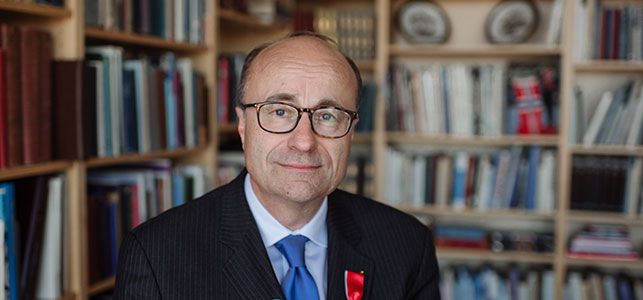 |
|
| Photo by Becca Tilly |
In the September issue of Viking magazine, we highlight Norwegian Ambassador Hans Brattskar. For more than 30 years, he has represented Norway as a diplomat promoting peace around the world and tackling global issues such as deforestation, women’s rights and education. This month, he starts a new role as Ambassador and Permanent Representative to the United Nations and Other International Organizations in Geneva, Switzerland. See more from our conversation here.
Q: You’ve lived many places around the world with your wife and three daughters. How has that lifestyle influenced your family?
A: As a family, we became very close knit. We’ve moved very few years together. We’ve always had good friends wherever we lived, but everyone knows it’s short term. You get an additional value on family life. Children also learn about other cultures. We have a different kind of respect for culture than if we would have just stayed at home in Norway. We have seen war and natural disaster up close. All those things affect you in a different way. You feel like the problems in the world are much closer to you. Not all children enjoy moving from country to country. Now that my daughters are adults, they say it was good for them.
Q: You’re passionate about education for women and girls. What are your views on that topic?
A: It’s essential for any country to invest in education. It’s very important to promote the rights of girls in developing countries. It’s also a passion of Norway’s Prime Minister and the Foreign Minister of Uganda. The government decided to look at where international leadership is lacking and where we really need to do something. In developing countries, there are a lot of young people needing education and jobs. We know from the Norwegian experience that when we invest in education for all, especially education for girls, it changes society for the better. It’s also very important for economic growth. If you look at the Norwegian experience 40 years back in time, the participation of women in the workforce in Norway was less. It was not as common for women to be in the workforce compared to other European countries. Now we are at the top. That has been an extremely important thing for social justice and equal rights and economic growth. In 2013, the Prime Minister decided to double the investment in education for development.
Q: What are some of Norway’s views on peace and reconciliation?
A: Peace and reconciliation work is something we’ve had an emphasis on for a long time. Our current world is seeing increased violence, more terrorism and armed conflicts in the past 25 years. We know we may not always be successful in engaging in peace and reconciliation work. But it’s something it’s something we absolutely necessary to engage in. We try to make a positive difference. There is very strong political support in Norway for doing that.
Q: Do you have advice for people wanting to promote diplomacy?
A: You could get involved in foreign service, work with nongovernmental organizations or the United Nations. But you don’t have to do it as a profession. You can engage in different ways in daily life through local churches, NGOs and organizations in the community. With modern technology, it’s so easy to engage with anyone in the world.

